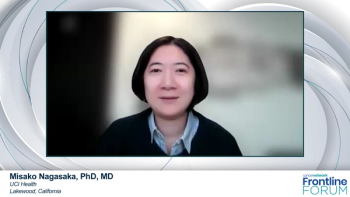
Introduction to HER2-Directed Tumor-Agnostic Approaches

Your AI-Trained Oncology Knowledge Connection!


Introduction to HER2-Directed Tumor-Agnostic Approaches

Panelist discusses how HER2 testing evaluates protein overexpression, gene amplification, and mutations. Although breast and gastric cancers typically show overexpression/amplification, other tumors more commonly harbor mutations.

Panelist discusses how the DESTINY-Lung02 trial was a dose optimization study where patients with HER2-mutated non–small cell lung cancer (NSCLC) were randomly assigned to a starting dose of 5.4 mg/kg vs 6.4 mg/kg of trastuzumab deruxtecan (T-DXd). DESTINY-Lung03 was a frontline study for HER2 overexpression in NSCLC looking at different combinations of treatment with T-DXd and immunotherapy agents with or without chemotherapy.

Panelist discusses how HER2-directed tumor-agnostic therapies represent an emerging treatment paradigm focused on targeting HER2 mutations regardless of cancer type. Current agents such as trastuzumab deruxtecan show promise across multiple tumor types that express HER2, moving beyond traditional cancer-specific approaches. This precision medicine strategy may expand treatment options and improve outcomes for patients with HER2-altered cancers who previously had limited therapeutic choices.

Panelist discusses how the DESTINY-PanTumor02 study enrolled 267 patients with different tumor types, including endometrial, cervical, ovarian, bladder, biliary tract, and pancreatic cancer.

Panelist discusses how HER2-directed tumor-agnostic treatments are likely to see expanded applications across multiple cancer types, driven by improved biomarker testing and emerging clinical evidence. This approach may become increasingly personalized through enhanced molecular profiling, potentially leading to more precise patient selection and combination strategies.